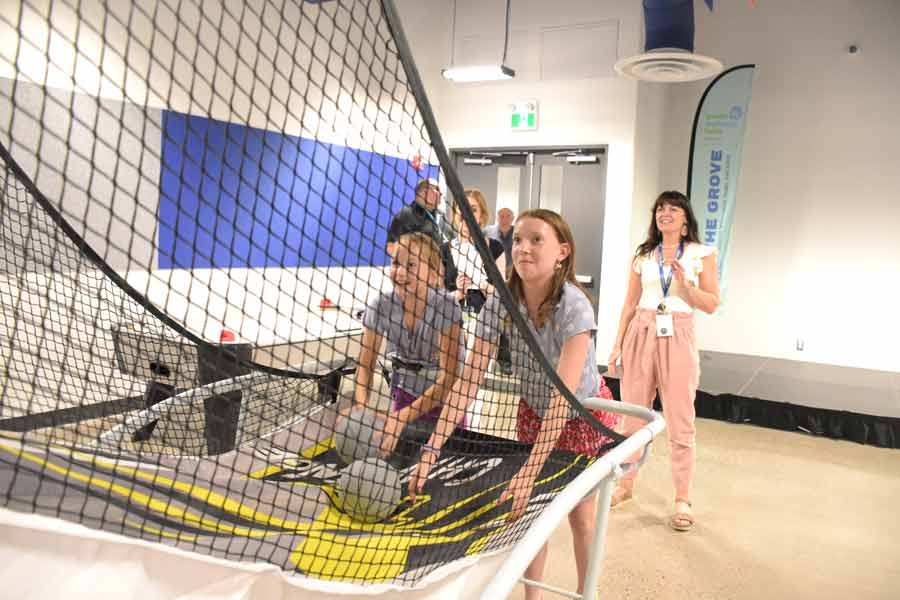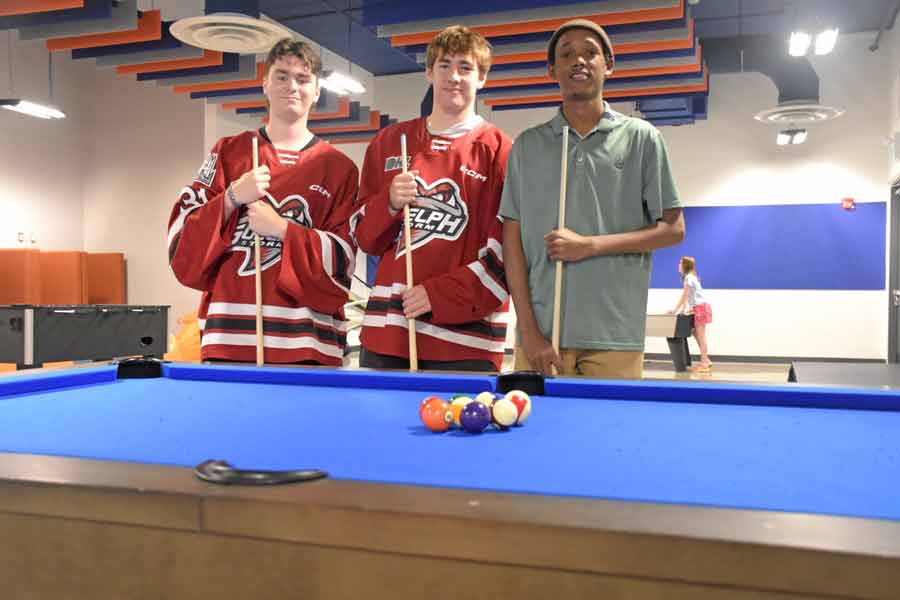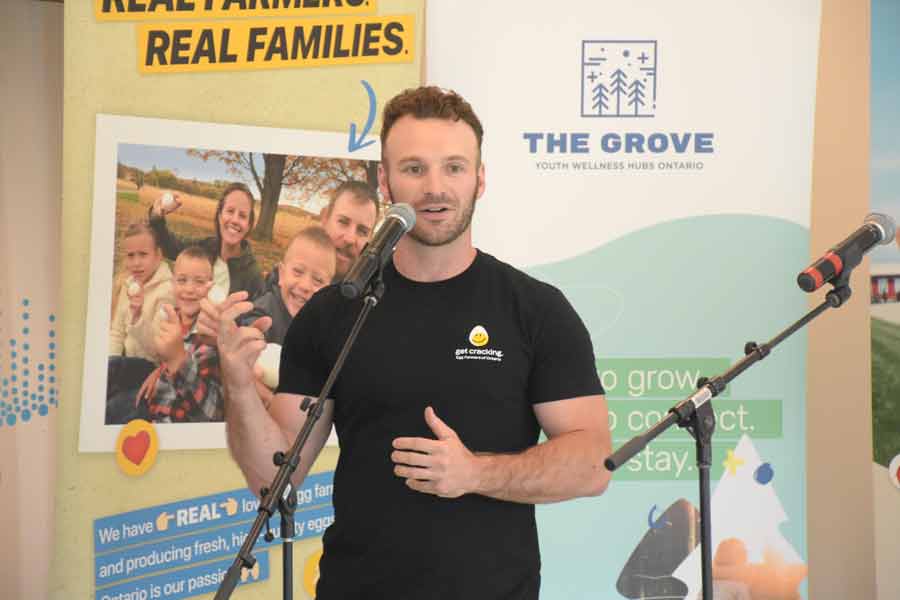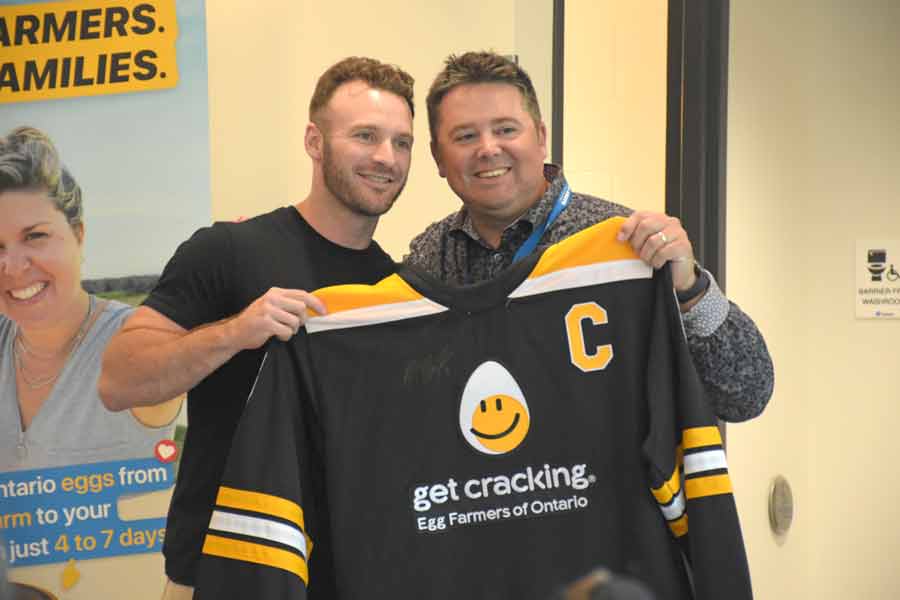GUELPH – The Grove Youth Hubs in Guelph and Wellington County have seen 32,000 youth enter their doors in the past year.
Not quite that many people entered the doors of the newest Grove hub – at 737 Woolwich St. in Guelph – for an open house on June 5, but it was still a revolving door at the facility from afternoon to early evening.
“We had no idea what to expect but the turnout has been awesome,” executive director Jeff Hoffman told the gathering.
“We need safe places for young people; spaces where young people feel welcome and where all young people can come to access all sorts of services.
“Today we share this space with the community.”
There are now six Grove hubs in the region – in Fergus, Palmerston, Erin and three in Guelph, and a fourth Guelph site is to open later this year.
Each has its own flavour but they all offer peer-to-peer support, career counselling, after-school tutoring, mental health counselling, substance abuse counselling and youth programs.

Mia Alexander, left, and Violet Sharman play a round of basketball at the Grove open house on June 5 in Guelph. Photo by Joanne Shuttleworth
They have kitchens, recreation space, study rooms and larger rooms for group work.
The Woolwich Street hub has showers, laundry facilities and a nurse who visits twice a week.
And they have partnerships with some 40 community groups that can help with other matters, like housing, financial support and finding employment.
Not much of that was taking place during the open house, but the activity room was busy with visitors playing pool, basketball and other games.
The kitchen was employed for making popcorn and there was an ice cream truck outside.
Many came to hear guest speaker Tyler McGregor, captain for Team Canada’s Para-ice hockey team, who has competed in three World Para-Ice Hockey championships and three Paralympic Winter Games.
He shared his story of hope, hopes dashed, and rebuilding his life to find hope again.

Guelph Storm players Brayden Gillespie, left, and Parker Snelgrove, middle, show Ismal Ali a few things about pool at the June 5 open house for the Groves’ new Woolwich Street location. Photo by Joanne Shuttleworth
McGregor said he was always an athlete and strapped on his first pair of skates when he was three. He was going to be a hockey player.
At age 15 he was well on his way to that dream when he fractured his tibia and fibula.
A mass was discovered on the side of the fracture. He had a form of bone cancer very similar to Canadian legend Terry Fox.
Thankfully, with advances in medicine, McGregor had an 80 per cent chance of survival. For Fox it was 20%, he said.
But after months of chemotherapy, doctors decided they had to remove his leg above the knee.
“I was 15 and naïve to how that would change my life,” he said, adding it was challenging to re-learn basics like walking.
“But there was always this seed of belief I would get back to sport.”

Tyler McGregor, captain of Team Canada’s Para-ice hockey team, spoke at an open house on June 5 for the newest Grove youth hub location in Guelph. Photo by Joanne Shuttleworth
McGregor’s recovery aligned with the 2010 Olympics and Paralympics in Vancouver, and he watched the games religiously.
And for the first time he saw sledge hockey. When he was well enough, he started to play.
“It was a new way to chase the same dream I had before,” he said.
“It was an unknown path – I had to play hockey in a new way with new challenges and opportunities.
“But I got to be part of a team, part of a community that’s bigger than sport. It taught me about life, about integrity.”
None of it was easy, McGregor said. And that was his main message to the young people in the audience.
“Life can be difficult and unexpected. It can go well until it’s not going so well,” he said.
“But within that is the incredible importance of community support. And that’s what you have here.
“Spaces like this are amazing.”




